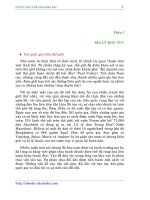The belton estate
Bạn đang xem bản rút gọn của tài liệu. Xem và tải ngay bản đầy đủ của tài liệu tại đây (1.51 MB, 425 trang )
TheProjectGutenbergeBook,TheBeltonEstate,byAnthonyTrollope
ThiseBookisfortheuseofanyoneanywhereatnocostandwith
almostnorestrictionswhatsoever.Youmaycopyit,giveitawayor
re-useitunderthetermsoftheProjectGutenbergLicenseincluded
withthiseBookoronlineatwww.gutenberg.org
Title:TheBeltonEstate
Author:AnthonyTrollope
ReleaseDate:April7,2002[eBook#4969]
MostrecentlyupdatedandHTMLversionadded:August13,2010
Language:English
Charactersetencoding:ISO-8859-1
***START OF THE PROJECT GUTENBERG EBOOK THE BELTON
ESTATE***
E-textpreparedbyAndrewTurek
andrevisedbyRitaBaileyandJosephE.Loewenstein,M.D.
HTMLversionpreparedbyJosephE.Loewenstein,M.D.
THEBELTONESTATE
BY
ANTHONYTROLLOPE
FirstpublishedinserialformintheFortnightlyReview
in1865andinbookformthesameyear
CONTENTS.
CHAPTERI.
CHAPTERII.
CHAPTERIII.
CHAPTERIV.
CHAPTERV.
CHAPTERVI.
CHAPTERVII.
CHAPTERVIII.
CHAPTERIX.
THEREMNANTSOFTHEAMEDROZFAMILY.
THEHEIRPROPOSESTOVISITHISCOUSINS.
WILLBELTON.
SAFEAGAINSTLOVE-MAKING.
NOTSAFEAGAINSTLOVE-MAKING.
SAFEAGAINSTLOVE-MAKINGONCEAGAIN.
MISSAMEDROZGOESTOPERIVALE.
CAPTAINAYLMERMEETSHISCONSTITUENTS.
CAPTAINAYLMER'SPROMISETOHISAUNT.
SHOWINGHOWCAPTAINAYLMERKEPT
CHAPTERX.
HISPROMISE.
CHAPTERXI.
MISSAMEDROZISTOOCANDIDBYHALF.
CHAPTERXII.
MISSAMEDROZRETURNSHOME.
MR.WILLIAMBELTONTAKESAWALK
CHAPTERXIII.
INTHECOUNTRY.
MR.WILLIAMBELTONTAKESAWALK
CHAPTERXIV.
INLONDON.
CHAPTERXV.
EVILWORDS.
CHAPTERXVI.
THEHEIR'SSECONDVISITTOBELTON.
CHAPTERXVII. AYLMERPARK.
CHAPTERXVIII. MRS.ASKERTON'SSTORY.
CHAPTERXIX.
MISSAMEDROZHASANOTHERCHANCE.
WILLIAMBELTONDOESNOTGOOUT
CHAPTERXX.
HUNTING.
CHAPTERXXI.
MRS.ASKERTON'SGENEROSITY.
CHAPTERXXII. PASSIONATEPLEADING.
CHAPTERXXIII. THELASTDAYATBELTON.
CHAPTERXXIV. THEGREATNORTHERNRAILWAYHOTEL.
CHAPTERXXV. MISSAMEDROZHASSOMEHASHEDCHICKEN.
THEAYLMERPARKHASHEDCHICKEN
CHAPTERXXVI.
COMESTOANEND.
CHAPTERXXVII. ONCEMOREBACKTOBELTON.
CHAPTERXXVIII. MISSAMEDROZISPURSUED.
CHAPTERXXIX. THEREISNOTHINGTOTELL.
CHAPTERXXX. MARYBELTON.
CHAPTERXXXI. TAKINGPOSSESSION.
CHAPTERXXXII. CONCLUSION.
CHAPTERI.
THEREMNANTSOFTHEAMEDROZFAMILY.
Mrs. Amedroz, the wife of Bernard Amedroz, Esq., of Belton Castle, and
motherofCharlesandClaraAmedroz,diedwhenthosechildrenwereonlyeight
and six years old, thereby subjecting them to the greatest misfortune which
childrenborninthatsphereoflifecanbemadetosuffer.And,inthecaseofthis
boy and girl the misfortune was aggravated greatly by the peculiarities of the
father'scharacter.Mr.Amedrozwasnotabadman,—asmenareheldtobebad
intheworld'sesteem.Hewasnotvicious,—wasnotagambleroradrunkard,—
wasnotself-indulgenttoadegreethatbroughtuponhimanyreproach;norwas
heregardlessofhischildren.Buthewasanidle,thriftlessman,who,attheage
ofsixty-seven,whenthereaderwillfirstmakehisacquaintance,hadasyetdone
no good in the world whatever. Indeed he had done terrible evil; for his son
Charleswasnowdead,—hadperishedbyhisownhand,—andthestateofthings
which had brought about this woful event had been chiefly due to the father's
neglect.
Belton Castle is a pretty country seat, standing in a small but beautifully
wooded park, close under the Quantock hills in Somersetshire; and the little
townofBeltonclustersroundtheparkgates.FewEnglishmenknowthescenery
of England well, and the prettinesses of Somersetshire are among those which
are the least known. But the Quantock hills are very lovely, with their rich
valleys lying close among them, and their outlying moorlands running off
towards Dulverton and the borders of Devonshire,—moorlands which are not
flat,likeSalisburyPlain,butarebrokenintoravinesanddeepwatercoursesand
ruggeddellshitherandthither;whereoldoaksarestanding,inwhichlifeseems
tohave,dwindleddowntothelastspark;butthelastsparkisstillthere,andthe
oldoaksgiveforththeirscantyleavesfromyeartoyear.
In amongthehills,somewhatoff thehighroadfromMineheadto Taunton,
and about five miles from the sea, stands the little town, or village, of Belton,
and the modern house of Mr. Amedroz, which is called Belton Castle. The
village,—for it is in truth no more, though it still maintains a charter for a
market,andtherestillexistsonTuesdayssomepretenceofanopensaleofgrain
and butcher's meat in the square before the church-gate,—contains about two
thousandpersons.ThatandthewholeparishofBeltondidonce,—andthatnot
long ago,—belong to the Amedroz family. They had inherited it from the
Beltonsofold,anAmedrozhavingmarriedtheheiressofthefamily.Andasthe
parishislarge,stretchingawaytoExmoorononeside,andalmosttotheseaon
theother,containingthehamletofRedicote,lyingontheTauntonhighroad,—
Redicote,wherethepost-officeisplaced,atownalmostinitself,andonewhich
isnowmuchmoreprosperousthanBelton,—asthepropertywhenitcametothe
firstAmedrozhadlimitssuchasthese,thefamilyhadbeenconsiderableinthe
county. But these limits had been straitened in the days of the grandfather and
thefatherofBernardAmedroz;andhe,whenhemarriedaMissWinterfieldof
Taunton,wasthoughttohavedoneverywell,inthatmortgageswerepaidoffthe
property with his wife's money to such an extent as to leave him in clear
possessionofanestatethatgavehimtwothousandayear.AsMr.Amedrozhad
no grand neighbours near him, as the place is remote and the living therefore
cheap,andaswiththisincometherewasnoquestionofannualvisitstoLondon,
Mr.andMrs.Amedrozmighthavedoneverywellwithsuchofthegoodthings
of the world as had fallen to their lot. And had the wife lived such would
probably have been the case; for the Winterfields were known to be prudent
people. But Mrs. Amedroz had died young, and things with Bernard Amedroz
hadgonebadly.
Andyettheevilhadnotbeensomuchwithhimaswiththatterribleboyof
his.Thefatherhadbeennearlyfortywhenhemarried.Hehadthenneverdone
anygood;butasneitherhadhedonemuchharm,thefriendsofthefamilyhad
arguedwellofhisfuturecareer.Afterhim,unlessheshouldleaveasonbehind
him, there would be no Amedroz left among the Quantock hills; and by some
arrangement in respect to that Winterfield money which came to him on his
marriage,—theWinterfieldshavingalong-datedconnectionwiththeBeltonsof
old,—the Amedroz property was, at Bernard's marriage, entailed back upon a
distantBeltoncousin,oneWillBelton,whomnoonehadseenformanyyears,
butwhowasbybloodnearertothesquire,indefaultofchildrenofhisown,than
anyotherofhisrelatives.AndnowWillBeltonwastheheirtoBeltonCastle;for
Charles Amedroz, at the age of twenty-seven, had found the miseries of the
worldtobetoomanyforhim,andhadputanendtothemandtohimself.
Charles had been a clever fellow,—a very clever fellow in the eyes of his
father. Bernard Amedroz knew that he himself was not a clever fellow, and
admiredhissonaccordingly;andwhenCharleshadbeenexpelledfromHarrow
for some boyish freak,—in his vengeance against a neighbouring farmer, who
hadreportedtotheschoolauthoritiesthedoingsofafewbeaglesuponhisland,
Charleshadcutofftheheadsofallthetreesinayoungfirplantation,—hisfather
was proud of the exploit. When he was rusticated a second time from Trinity,
and when the father received an intimation that his son's name had better be
takenfromtheCollegebooks,thesquirewasnotsowellpleased;buteventhen
hefoundsomedelightinthestorieswhichreachedhimofhisson'svagaries;and
when the young man commenced Bohemian life in London, his father did
nothingtorestrainhim.Thentherecametheoldstory—debts,endlessdebts;and
lies,endlesslies.Duringthetwoyearsbeforehisdeath,hisfatherpaidforhim,
orundertooktopay,nearlytenthousandpounds,sacrificingthelifeassurances
which were to have made provision for his daughter; sacrificing, to a great
extent,hisownlifeincome,—sacrificingeverything,sothatthepropertymight
not be utterly ruined at his death. That Charles Amedroz should be a brighter,
greatermanthananyotherAmedroz,hadstillbeenthefather'spride.Atthelast
visitwhichCharleshadpaidtoBeltonhisfatherhadcalleduponhimtopledge
himselfsolemnlythathissistershouldnotbemadetosufferbywhathadbeen
done for him. Within a month of that time he had blown his brains out in his
London lodgings, thus making over the entire property to Will Belton at his
father's death. At that last pretended settlement with his father and his father's
lawyer,hehadkeptbackthementionofdebtsasheavynearlyasthosetowhich
hehadowned;andthereweredebtsofhonour,too,ofwhichhehadnotspoken,
trusting to the next event at Newmarket to set him right. The next event at
Newmarkethadsethimmorewrongthanever,andsotherehadcomeanendto
everythingwithCharlesAmedroz.
Thishadhappenedinthespring,andtheafflictedfather,—afflictedwiththe
doublesorrowofhisson'sterribledeathandhisdaughter'sruin,—haddeclared
thathewouldturnhisfacetothewallanddie.Buttheoldsquire'shealth,though
far from strong, was stronger than he had deemed it, and his feelings, sharp
enough,werelesssharpthanhehadthoughtthem;andwhenamonthhadpassed
by,hehaddiscoveredthatitwouldbebetterthatheshouldlive,inorderthathis
daughter might still have bread to eat and a house of her own over her head.
Thoughhewasnowanimpoverishedman,therewasstilllefttohimthemeans
ofkeepinguptheoldhome;andhetoldhimselfthatitmust,ifpossible,beso
kept that a few pounds annually might be put by for Clara. The old carriagehorses were sold, and the park was let to a farmer, up to the hall door of the
castle.Somuchthesquirecoulddo;butastotheputtingbyofthefewpounds,
anydependenceonsuchexertionasthatonhispartwould,wemaysay,bevery
precarious.
BeltonCastlewasnotintruthacastle.Immediatelybeforethefrontdoor,so
neartothehouseasmerelytoallowofabroadroadrunningbetweenitandthe
entranceporch,therestoodanoldtower,whichgaveitsnametotheresidence,—
anoldsquaretower,upwhichtheAmedrozboysforthreegenerationshadbeen
abletoclimbbymeansoftheivyandbrokenstonesinoneoftheinnercorners,
—and this tower was a remnant of a real castle that had once protected the
villageofBelton.Thehouseitselfwasanuglyresidence,threestorieshigh,built
in the time of George II., with low rooms and long passages, and an immense
number of doors. It was a large unattractive house,—unattractive, that is, as
regarded its own attributes,—but made interesting by the beauty of the small
park in which it stood. Belton Park did not, perhaps, contain much above a
hundred acres, but the land was so broken into knolls and valleys, in so many
placeswastherockseentobecroppingupthroughtheverdure,therewereinit
so many stunted old oaks, so many points of vantage for the lover of scenery,
thatnoonewouldbelieveittobeotherthanaconsiderabledomain.Thefarmer
whotookit,andwhowouldnotunderanycircumstancesundertaketopaymore
thanseventeenshillingsanacreforit,couldnotbemadetothinkthatitwasin
anywayconsiderable.ButBeltonPark,sincefirstitwasmadeapark,hadnever
beforebeen regardedafterthisfashion. FarmerStovey,oftheGrange, wasthe
first man of that class who had ever assumed the right to pasture his sheep in
Beltonchase,—asthepeoplearoundwerestillaccustomedtocallthewoodlands
oftheestate.
It was full summer at Belton, and four months had now passed since the
dreadfultidingshadreachedthecastle.Itwasfullsummer,andthepeopleofthe
villagewereagaingoingabouttheirordinarybusiness;andtheshop-girls,with
theirloversfromRedicote,wereagaintobeseenwalkingamongtheoaksinthe
park on a Sunday evening; and the world in that district of Somersetshire was
gettingitselfbackintoitsgrooves.Thefateoftheyoungheirhaddisturbedthe
grooves greatly, and had taught many in those parts to feel that the world was
comingtoanend.TheyhadnotlovedyoungAmedroz,forhehadbeenhaughty
whenamongthem,andtherehadbeenwrongscommittedbythedissoluteyoung
squire,andgriefhadcomefromhismisdoingsuponmorethanonehousehold;
buttothinkthatheshouldhavedestroyedhimselfwithhisownhand!Andthen,
tothinkthatMissClarawouldbecomeabeggarwhentheoldsquireshoulddie!
Alltheneighboursaroundunderstoodthewholehistoryoftheentail,andknew
that the property was to go to Will Belton. Now Will Belton was not a
gentleman! So, at least, said the Belton folk, who had heard that the heir had
beenbroughtupasafarmersomewhereinNorfolk.WillBeltonhadoncebeen
attheCastleasaboy,nowsomefifteenyearsago,andthentherehadsprungup
agreatquarrelbetweenhimandhisdistantcousinCharles;—andWill,whowas
roughandlargeofstature,hadthrashedthesmallerboyseverely;andthething
had grown to have dimensions larger than those which generally attend the
quarrels of boys; and Will had said something which had shown how well he
understoodhispositioninreferencetotheestate;—andCharleshadhatedhim.
SoWillhadgone,andhadbeennomoreseenamongtheoakswhosenamehe
bore. And the people, in spite of his name, regarded him as an interloper. To
them,withtheirshortmemoriesandscantyknowledgeofthepast,Amedrozwas
more honourable than Belton, and they looked upon the coming man as an
intruder. Why should not Miss Clara have the property? Miss Clara had never
doneharmtoanyone!
Thingsgotbackintotheiroldgrooves,andattheendofthethirdmonththe
squirewasoncemoreseenintheoldfamilypewatchurch.Hewasalargeman,
whohadbeenveryhandsome,andwhonow,inhisyellowleaf,wasnotwithout
a certain beauty of manliness. He wore his hair and his beard long; before his
son's death they were grey, but now they were very white. And though he
stooped,therewasstilladignityinhisslowstep,—adignitythatcametohim
fromnatureratherthanfromanyeffort.Hewasamanwho,infact,didlittleor
nothingintheworld,—whoselifehadbeenveryuseless;buthehadbeengifted
with such a presence that he looked as though he were one of God's nobler
creatures.Thoughalwaysdignifiedhewaseveraffable,andthepoorlikedhim
betterthantheymighthavedonehadhepassedhistimeinsearchingouttheir
wantsandsupplyingthem.Theywereproudoftheirsquire,thoughhehaddone
nothingforthem.Itwassomethingtothemtohaveamanwhocouldsocarry
himselfsittinginthefamilypewintheirparishchurch.Theyknewthathewas
poor,buttheyalldeclaredthathewasnevermean.Hewasarealgentleman,—
wasthislastAmedrozofthefamily;thereforetheycurtsiedlow,andbowedon
hisreappearanceamongthem,andmadeallthosesignsofreverentialawewhich
arecommontothepoorwhentheyfeelreverenceforthepresenceofasuperior.
Clarawastherewithhim,butshehadshownherselfinthepewforfouror
five weeks before this. She had not been at home when the fearful news had
reachedBelton,beingat thattimewithacertainladywholivedon thefurther
side of the county, at Perivale,—a certain Mrs. Winterfield, born a Folliott, a
widow, who stood to Miss Amedroz in the place of an aunt. Mrs. Winterfield
was, in truth, the sister of a gentleman who had married Clara's aunt,—there
having been marriages and intermarriages between the Winterfields and the
Folliotts,andtheBelton-Amedrozfamilies.WiththisladyinPerivale,whichI
maintain to be the dullest little town in England, Miss Amedroz was staying
whenthenewsreachedherfather,andwhenitwasbroughtdirectfromLondon
to herself. Instantly she had hurried home, making the journey with all
imaginablespeedthoughherheartwasallbutbrokenwithinherbosom.Shehad
foundherfatherstrickentotheground,anditwasthemorenecessary,therefore,
thatsheshould exertherself.Itwouldnotdothatshealsoshouldyieldtothat
longingfordeathwhichterriblecalamitiesoftenproduceforaseason.
ClaraAmedroz,whenshefirstheardthenewsofherbrother'sfate,hadfelt
thatshewasforevercrushedtotheground.Shehadknowntoowellwhathad
beenthenatureofherbrother'slife,butshehadnotexpectedorfearedanysuch
terminationtohiscareerasthiswhichhadnowcomeuponhim—totheterrible
afflictionofallbelongingtohim.Shefeltatfirst,asdidalsoherfather,thatshe
andhewereannihilatedasregardsthisworld,notonlybyanenduringgrief,but
alsobyadisgracewhichwouldneverallowheragaintoholdupherhead.And
formanyalongyearmuchofthisfeelingclungtoher;—clungtohermuchmore
strongly than to her father. But strength was hers to perceive, even before she
hadreachedherhome,thatitwasherdutytorepressboththefeelingofshame
andthesorrow,asfarastheywerecapableofrepression.Herbrotherhadbeen
weak, and in his weakness had sought a coward's escape from the ills of the
worldaroundhim.Shemustnotalsobeacoward!Badaslifemightbetoher
henceforth, she must endure it with such fortitude as she could muster. So
resolvingshereturnedtoherfather,andwasabletolistentohisrailingswitha
fortitudethatwasessentiallyserviceablebothtohimandtoherself.
"Both of you! Both of you!" the unhappy father had said in his woe. "The
wretched boy has destroyed you as much as himself!" "No, sir," she had
answered,withaforbearanceinhermisery,which,terribleaswastheeffort,she
forcedherselftoaccomplishforhissake."Itisnotso.Nothoughtofthatneed
addtoyourgrief.Mypoorbrotherhasnothurtme;—notinthewayyoumean."
"He has ruined us all," said the father; "root and branch, man and woman, old
and young, house and land. He has brought the family to an end;—ah me, to
such an end!" After that the name of him who had taken himself from among
them was not mentioned between the father and daughter, and Clara settled
herselftothedutiesofhernewlife,strivingtoliveasthoughtherewasnogreat
sorrowaroundher—asthoughnocloud-stormhadburstoverherhead.
The family lawyer, who lived at Taunton, had communicated the fact of
Charles'sdeathtoMr.Belton,andBeltonhadacknowledgedtheletterwiththe
ordinaryexpressionsofregret.Thelawyerhadalludedtotheentail,sayingthat
itwasimprobablethatMr.Amedrozwouldhaveanotherson.TothisBeltonhad
replied that for his cousin Clara's sake he hoped that the squire's life might be
long spared. The lawyer smiled as he read the wish, thinking to himself that
luckilynowishonthepartofWillBeltoncouldinfluencehisoldclienteitherfor
goodorevil.Whatman,letalonewhatlawyer,willeverbelieveinthesincerity
ofsuchawishasthatexpressedbytheheirtoaproperty?Andyetwhereisthe
manwhowillnotdeclaretohimselfthatsuch,undersuchcircumstances,would
behisownwish?
Clara Amedroz at this time was not a very young lady. She had already
passedhertwenty-fifthbirthday,andinmanners,appearance,andhabitswas,at
anyrate,asoldasherage.Shemadenopretencetoyouth,speakingofherself
alwaysasonewhomcircumstancesrequiredtotakeuponherselfageinadvance
of her years. She did not dress young, or live much with young people, or
correspondwithothergirlsbymeansofcrossedletters;norexpectthat,forher,
youngpleasuresshouldbeprovided.Lifehadalwaysbeenseriouswithher;but
now,wemaysay,sincetheterribletragedyinthefamily,itmustbesolemnas
well as serious. The memory of her brother must always be upon her; and the
memoryalsoofthefactthatherfatherwasnowanimpoverishedman,onwhose
behalfitwasherdutytocarethateveryshillingspentinthehousediditsfull
twelvepennies'worthofwork.Therewasamixtureinthisofdeeptragedyand
oflittlecare,whichseemedtodestroyforherthepoetryaswellasthepleasure
oflife.Thepoetryandtragedymighthavegonehandinhandtogether;andso
mightthecaresandpleasuresoflifehavedone,hadtherebeennoblacksorrow
ofwhichshemustbeevermindful.Butitwasherlottohavetoscrutinizethe
butcher'sbillasshewasthinkingofherbrother'sfate;andtoworkdailyamong
smallhouseholdthingswhilethespectreofherbrother'scorpsewaseverbefore
hereyes.
Awordmustbesaidtoexplainhowithadcometopassthatthelifeledby
Miss Amedroz had been more than commonly serious before that tragedy had
befallenthefamily.ThenameoftheladywhostoodtoClaraintheplaceofan
aunt has been already mentioned. When a girl has a mother, her aunt may be
little or nothing to her. But when the mother is gone, if there be an aunt
unimpededwithotherfamilyduties,thenthefamilydutiesofthatauntbegin—
andareassumedsometimeswithgreatvigour.SuchhadbeenthecasewithMrs.
Winterfield.Nowomaneverlived,perhaps,withmoreconscientiousideasofher
dutyasawomanthanMrs.WinterfieldofProspectPlace,Perivale.Andthis,asI
say it, is intended to convey no scoff against that excellent lady. She was an
excellentlady—unselfish,giventoself-restraint,generous,pious,lookingtofind
inherreligionasafepaththroughlife—apathassafeasthefactsofAdam'sfall
would allow her feet to find. She was a woman fearing much for others, but
fearingalsomuchforherself,strivingtomaintainherhouseingodliness,hating
sin, and struggling with the weakness of her humanity so that she might not
allow herself to hate the sinners. But her hatred for the sin she found herself
boundatalltimestopronounce—toshowitbysomeactatallseasons.Tofight
the devil was her work—was the appointed work of every living soul, if only
living souls could be made to acknowledge the necessity of the task. Now an
auntofthatkind,whensheassumesherdutiestowardsamotherlessniece,isapt
tomakelifeserious.
But, it will be said, Clara Amedroz could have rebelled; and Clara's father
washardlymadeofsuchstuffthatobediencetotheauntwouldbeenforcedon
herbyparentalauthority.DoubtlessClaracouldhaverebelledagainstheraunt.
Indeed,Idonotknowthatshehadhithertobeenveryobedient.Buttherewere
family facts about these Winterfield connections which would have made it
difficultforhertoignoreherso-calledaunt,evenhadshewishedtodoso.Mrs.
Winterfieldhadtwelvehundredayearatherowndisposal,andshewastheonly
person related to the Amedroz family from whom Mr. Amedroz had a right to
have expectations on his daughter's behalf. Clara had, in a measure, been
claimed by the lady, and the father had made good the lady's claim, and Clara
hadacknowledgedthataportionofherlifewasduetothedemandsofPerivale.
Thesedemandshadundoubtedlymadeherlifeserious.
LifeatPerivalewasaveryseriousthing.Asregardsamusement,ordinarily
so called, the need of any such institution was not acknowledged at Prospect
House. Food, drink, and raiment were acknowledged to be necessary to
humanity,and,inaccordancewiththerulesofthathouse,theyweresuppliedin
plenty, and good of their kind. Such ladies as Mrs. Winterfield generally keep
good tables, thinking no doubt that the eatables should do honour to the grace
thatissaidforthem.AndMrs.Winterfieldherselfalwaysworeathickblacksilk
dress,—not rusty or dowdy with age,—but with some gloss of the silk on it;
giving away, with secret, underhand, undiscovered charity, her old dresses to
anotherladyofherownsort,onwhomfortunehadnotbestowedtwelvehundred
ayear.AndMrs.Winterfieldkeptalow,four-wheeled,one-horsedlittlephaeton,
in which she made her pilgrimages among the poor of Perivale, driven by the
mostsolemnofstable-boys,dressedupinawhitegreatcoat,themostpriggish
ofhats,andwhitecottongloves.Attherateoffivemilesanhourwasshedriven
about,andthisdrivingwastohertheamusementoflife.Butsuchanoccupation
toClaraAmedrozassistedtomakelifeserious.
InpersonMrs.Winterfieldwastallandthin,wearingonherbrowthinbraids
of false hair. She had suffered much from acute ill health, and her jaws were
sunken,andhereyeswerehollow,andtherewasalookofwoeaboutherwhich
seemedevertobetellingofherownsorrowsinthisworldandofthesorrowsof
others in the world to come. Ill-nature was written on her face, but in this her
facewasafalseface.Shehadthemannersofacross,peevishwoman;buther
mannersalsowerefalse,andgavenoproperideaofhercharacter.Butstill,such
asshewas,shemadelifeveryserioustothosewhowerecalledupontodwell
withher.
I need, I hope, hardly say that a young lady such as Miss Amedroz, even
thoughshehadreachedtheageoftwenty-five,—foratthetimetowhichIam
now alluding she had nearly done so,—and was not young of her age, had
formedforherselfnoplanoflifeinwhichheraunt'smoneyfiguredasamotive
power. She had gone to Perivale when she was very young, because she had
beentoldtodoso,andhadcontinuedtogo,partlyfromobedience,partlyfrom
habit,andpartlyfromaffection.Anaunt'sdominion,whenoncewellestablished
inearlyyears,cannoteasilybethrownaltogetheraside,—eventhoughayoung
ladyhaveawillofherown.NowClaraAmedrozhadastrongwillofherown,
and did not at all,—at any rate in these latter days,—belong to that school of
divinity in which her aunt shone almost as a professor. And this circumstance,
also,addedtotheseriousnessofherlife.Butinregardtoheraunt'smoneyshe
hadentertainednoestablishedhopes;andwhenherauntopenedhermindtoher
onthatsubject,afewdaysbeforethearrivalofthefatalnewsatPerivale,Clara,
thoughshewassomewhatsurprised,wasbynomeansdisappointed.Nowthere
wasacertainCaptainAylmerinthequestion,ofwhominthisopeningchapterit
willbenecessarytosayafewwords.
Captain Frederic Folliott Aylmer was, in truth, the nephew of Mrs.
Winterfield, whereas Clara Amedroz was not, in truth, her niece. And Captain
Aylmer was also Member of Parliament for the little borough of Perivale,
returned altogether on the Low Church interest,—for a devotion to which, and
forthatalone,Perivalewasnotedamongboroughs.Thesefactstogetheradded
not a little to Mrs. Winterfield's influence and professorial power in the place,
and gave a dignity to the one-horse chaise which it might not otherwise have
possessed. But Captain Aylmer was only the second son of his father, Sir
AnthonyAylmer,whohadmarriedaMissFolliott,sisterofourMrs.Winterfield.
OnFredericAylmerhismother'sestatewassettled.ThatandMrs.Winterfield's
property lay in the neighbourhood of Perivale; and now, on the occasion to
whichIamalluding,Mrs.WinterfieldthoughtitnecessarytotellClarathatthe
propertymustallgotogether.Shehadthoughtaboutit,andhaddoubtedaboutit,
andhadprayedaboutit,andnowshefoundthatsuchadispositionofitwasher
duty.
"Iamquitesureyou'reright,aunt,"Clarahadsaid.Sheknewverywellwhat
hadcomeofthatprovisionwhichherfatherhadattemptedtomakeforher,and
knew also how great were her father's expectations in regard to Mrs.
Winterfield'smoney.
"IhopeIam;butIhavethoughtitrighttotellyou.Ishallfeelmyselfbound
totellFrederic.Ihavehadmanydoubts,butIthinkIamright."
"Iamsureyouare,aunt.Whatwouldhethinkofmeif,atsomefuturetime,
heshouldhavetofindthatIhadbeeninhisway?"
"Thefuturetimewillnotbelongnow,mydear."
"Ihopeitmay;butlongorshort,itisbetterso."
"Ithinkitis,mydear;Ithinkitis.Ithinkitismyduty."
ItmustbeunderstoodthatCaptainAylmerwasmemberforPerivaleonthe
Low Church interest, and that, therefore, when at Perivale he was decidedly a
LowChurchman.Iamnotawarethatthepeculiaritystucktohimverycloselyat
AylmerCastle,inYorkshire,oramonghisfriendsinLondon;buttherewasno
hypocrisyinthis,astheworldgoes.Womeninsuchmattersareabsolutelyfalse
if they be not sincere; but men, with political views, and with much of their
futureprospectsinjeopardyalso,areallowedtodressthemselvesdifferentlyfor
different scenes. Whatever be the peculiar interest on which a man goes into
Parliament,ofcoursehehastoliveuptothatinhisownborough.Whethermalt,
thefranchise,orteetotalismbehisrallyingpoint,ofcourseheisfullofitwhen
amonghisconstituents.Butitisnotdesirablethatheshouldbefullofitalsoat
hisclub.HadCaptainAylmerbecomePrimeMinister,hewouldnodoubt,have
madeLowChurchbishops.Itwasthesidetowhichhehadtakenhimselfinthat
matter,—not without good reasons. And he could say a sharp word or two in
season about vestments; he was strong against candles, and fought for his side
fairly well. No one had good right to complain of Captain Aylmer as being
insincere;buthadhisauntknownthewholehistoryofhernephew'slife,Idoubt
whethershewouldhavemadehimherheir,—thinkingthatindoingsoshewas
doingthebestforthegoodcause.
Thewholehistoryofherniece'slifeshedidknow,andsheknewthatClara
wasnotwithher,heartandsoul.HadClaralefttheoldwomanindoubtonthis
subject,shewouldhavebeenahypocrite.CaptainAylmerdidnotoftenspenda
Sunday at Perivale, but when he did, he went to church three times, and
submitted himself to the yoke. He was thinking of the borough votes quite as
muchasofhisaunt'smoney,andwascarryingonhisbusinessafterthefashion
of men. But Clara found herself compelled to maintain some sort of a fight,
though she also went to church three times on Sunday. And there was another
reasonwhyMrs.WinterfieldthoughtitrighttomentionCaptainAylmer'sname
tohernieceonthisoccasion.
"I had hoped," she said, "that it might make no difference in what way my
moneywasleft."
Clarawellunderstoodwhatthismeant,aswill,probably,thereaderalso."I
can'tsaybutwhatitwillmakeadifference,"sheanswered,smiling;"butIshall
alwaysthinkthatyouhavedoneright.WhyshouldIstandinCaptainAylmer's
way?"
"I had hoped your ways might have been the same," said the old lady,
fretfully.
"Buttheycannotbethesame."
"No; you do not see things as he sees them. Things that are serious to him
are,Ifear,onlylighttoyou.DearClara,wouldIcouldseeyoumoreinearnest
astotheonlymatterthatisworthourearnestness."MissAmedrozsaidnothing
astotheCaptain'searnestness,though,perhaps,herideasastohisideasabout
religionweremorecorrectthanthoseheldbyMrs.Winterfield.Butitwouldnot
have suited her to raise any argument on that subject. "I pray for you, Clara,"
continuedtheoldlady;"andwilldosoaslongasthepowerofprayerisleftto
me.Ihope,—Ihopeyoudonotceasetoprayforyourself?"
"Iendeavour,aunt."
"Itisanendeavourwhich,ifreallymade,neverfails."
Clarasaidnothingmore,andherauntalsoremainedsilent.Soonafterwards,
the four-wheeled carriage, with the demure stable-boy, came to the door, and
ClarawasdrivenupanddownthroughthestreetsofPerivaleinamannerwhich
wasaninjurytoher.Sheknewthatshewassufferinganinjustice,butitwasone
ofwhichshecouldnotmakecomplaint.Shesubmittedtoheraunt,enduringthe
penances that were required of her; and, therefore, her aunt had opportunity
enoughtoseehershortcomings.Mrs.Winterfielddidseethem,andjudgedher
accordingly. Captain Aylmer, being a man and a Member of Parliament, was
calledupontobearnosuchpenances,and,therefore,hisshortcomingswerenot
suspected.
But,afterall,whattitlehadsheeverpossessedtoentertainexpectationsfrom
Mrs. Winterfield? When she thought of it all in her room that night, she told
herselfthatitwasstrangethatherauntshouldhavespokentoherinsuchaway
onsuchasubject.But,then,somuchhadbeensaidtoheronthematterbyher
father, so much, no doubt, had reached her aunt's ears also, the hope that her
positionwithreferencetotherichwidowatPerivalemightbebeneficialtoher
hadbeensooftendiscussedatBeltonasamake-weightagainsttheextravagance
of the heir, there had already been so much of this mistake, that she taught
herselftoperceivethatthecommunicationwasneeded."Inherhonestyshehas
not chosen to leave me with false hopes," said Clara to herself. And at that
momentshelovedherauntforherhonesty.
Then,onthedaybutonefollowingthisconversationastothedestinyofher
aunt'sproperty,cametheterribletidingsofherbrother'sdeath.CaptainAylmer,
whohadbeeninLondonatthetime,hurrieddowntoPerivale,andhadbeenthe
firsttotellMissAmedrozwhathadhappened.Thewordsspokenbetweenthem
thenhadnotbeenmany,butClaraknewthatCaptainAylmerhadbeenkindto
her;andwhenhehadofferedtoaccompanyhertoBelton,shehadthankedhim
with a degree of gratitude which had almost seemed to imply more of regard
between them than Clara would have acknowledged to exist. But in moments
suchasthose,softwordsmaybespokenandhandsmaybepressedwithoutany
ofthatmeaningwhichsoftwordsandthegraspingofhandsgenerallycarrywith
them.AsfarasTauntonCaptainAylmerdidgowithMissAmedroz,andthere
theyparted,heonhisjourneyuptotown,andsheforherfather'sdesolatehouse
atBelton.
CHAPTERII.
THEHEIRPROPOSESTOVISITHISCOUSINS.
It was full summer at Belton, and the sweet scent of the new hay filled the
porch of the old house with fragrance, as Clara sat there alone with her work.
Immediatelybeforethehousedoor,betweenthatandtheoldtower,therestood
one of Farmer Stovey's hay-carts, now empty, with an old horse between the
shafts looking as though he were asleep in the sun. Immediately beyond the
tower the men were loading another cart, and the women and children were
chatteringastheyrakedthescatteredremnantsuptotherows.Undertheshadow
oftheoldtower,butinsightofClaraasshesatintheporch,therelaythesmall
beer-barrels of the hay-makers, and three or four rakes were standing erect
againsttheoldgreywall.Itwasnoweleveno'clock,andClarawaswaitingfor
herfather,whowasnotyetoutofhisroom.Shehadtakenhisbreakfasttohim
inbed,aswashercustom;forhehadfallenintoidleways,andtheluxuryofhis
bed was, of all his remaining luxuries, the one that he liked the best. After a
whilehecamedowntoher,havinganopenletterinhishand.Clarasawthathe
intendedeithertoshowittoherortospeakofit,andaskedhimtherefore,with
some tone of interest in her voice, from whom it had come. But Mr. Amedroz
wasfretfulatthemoment,andinsteadofansweringherbegantocomplainofhis
tenant'sill-usageofhim.
"Whathashegothiscarttherefor?Ihaven'tlethimtheroaduptothehall
door.Isupposehewillbringhisthingsintotheparlournext."
"Iratherlikeit,papa."
"Doyou?Icanonlysaythatyou'reluckyinyourtastes.Idon'tlikeit,Ican
tellyou."
"Mr. Stovey is out there. Shall I ask him to have the things moved further
off?"
"No, my dear,—no. I must bear it, as I do all the rest of it. What does it
matter?There'llbeanendofitsoon.Hepayshisrent,andIsupposeheisright
todoashepleases.ButIcan'tsaythatIlikeit."
"AmItoseetheletter,papa?"sheasked,wishingtoturnhismindfromthe
subjectofthehay-cart.
"Well, yes. I brought it for you to see; though perhaps I should be doing
better if I burned it, and said nothing more about it. It is a most impudent
production;andheartless,—veryheartless."
Clara was accustomed to such complaints as these from her father.
Everything that everybody did around him he would call heartless. The man
pitied himself so much in his own misery, that he expected to live in an
atmosphere of pity from others; and though the pity doubtless was there, he
misdoubtedit.HethoughtthatFarmerStoveywascruelinthathehadleftthe
hay-cart near the house, to wound his eyes by reminding him that he was no
longermasterofthegroundbeforehisownhalldoor.Hethoughtthatthewomen
and children were cruel to chatter so near his ears. He almost accused his
daughterofcruelty,becauseshehadtoldhimthatshelikedthecontiguityofthe
hay-making.Undersuchcircumstancesasthosewhichenvelopedhimandher,
was it not heartless in her to like anything? It seemed to him that the whole
worldofBeltonshouldbedrownedinwoebecauseofhismisery.
"Whereisitfrom,papa?"sheasked.
"There,youmayreadit.Perhapsitisbetterthatyoushouldknowthatithas
beenwritten."Thenshereadtheletter,whichwasasfollows:—
"PlaistowHall,—July,186—."
Though she had never before seen the handwriting, she knew at once from
whencecametheletter,forshehadoftenheardofPlaistowHall.Itwasthename
of the farm at which her distant cousin, Will Belton, lived, and her father had
more than once been at the trouble of explaining to her, that though the place
wascalledahall,thehousewasnomorethanafarmhouse.Hehadneverseen
PlaistowHall,andhadneverbeeninNorfolk;butsomuchhecouldtakeupon
himselftosay,"Theycallallthefarmshallsdownthere."Itwasnotwonderful
thatheshoulddislikehisheir;and,perhaps,notunnaturalthatheshouldshow
hisdislikeafterthisfashion.Clara,whenshereadtheaddress,lookedupintoher
father'sface."Youknowwhoitisnow,"hesaid.Andthenshereadtheletter.
PlaistowHall,—July,186—.
MYDEARSIR,
I have not written to you before since your bereavement, thinking it
bettertowaitawhile;butIhopeyouhavenottakenmetobeunkindinthis,
or have supposed me to be unmindful of your sorrow. Now I take up my
pen,hopingthatImaymakeyouunderstandhowgreatlyIwasdistressed
bywhathasoccurred.IbelieveIamnowthenearestmalerelativethatyou
have, and as such I am very anxious to be of service to you if it may be
possible. Considering the closeness of our connection, and my position in
reference to the property, it seems bad that we should never meet. I can
assure you that you would find me very friendly if we could manage to
cometogether.
IshouldthinknothingofrunningacrosstoBelton,ifyouwouldreceive
meatyourhouse.Icouldcomeverywellbeforeharvest,ifthatwouldsuit
you,andwouldstaywithyouforaweek.Praygivemykindestregardsto
mycousinClara,whomIcanonlyjustrememberasaverylittlegirl.She
waswithherauntatPerivalewhenIwasatBeltonasaboy.Sheshallfinda
friendinmeifshewantsafriend.
Youraffectionatecousin,
W.BELTON.
Clara read the letter very slowly, so that she might make herself sure of its
toneandbearingbeforeshewascalleduponbyherfathertoexpressherfeeling
respectingit.Sheknewthatshewouldbeexpectedtoabuseitviolently,andto
accusethewriterofvulgarity,insolence,andcruelty;butshehadalreadylearned
that she must not allow herself to accede to all her father's fantasies. For his
sake,andforhisprotection,itwasnecessarythatsheshoulddifferfromhim,and
evencontradicthim.Wereshenottodoso,hewouldfallintoastateofwailing
and complaining that would exaggerate itself almost to idiotcy. And it was
imperative that she herself should exercise her own opinion on many points,
almostwithoutreferencetohim.Shealoneknewhowutterlydestituteshewould
bewhenheshoulddie.He,inthefirstdaysofhisagony,hadsobbedforthhis
remorseastoherruin;but,evenwhendoingso,hehadcomfortedhimselfwith
theremembranceofMrs.Winterfield'smoney,andMrs.Winterfield'saffection
forhisdaughter.Andtheaunt,whenshehaddeclaredherpurposetoClara,had
told herself that the provision made for Clara by her father was sufficient. To
neitherofthemhadClaratoldherownposition.Shecouldnotinformheraunt
thatherfatherhadgivenuptothepoorreprobatewhohaddestroyedhimselfall
thathadbeenintendedforher.Hadshedonesoshewouldhavebeenaskingher
aunt for charity. Nor would she bring herself to add to her father's misery, by
destroying the hopes which still supported him. She never spoke of her own
positioninregardtomoney,butsheknewthatithadbecomeherdutytolivea
wary,watchfullife,takingmuchuponherselfintheirimpoverishedhousehold,
and holding her own opinion against her father's when her doing so became
expedient.Soshefinishedtheletterinsilence,anddidnotspeakatthemoment
whenthemovementofhereyesdeclaredthatshehadcompletedthetask.
"Well,"saidhe.
"Idonotthinkmycousinmeansbadly."
"Youdon't!Ido,then.Ithinkhemeansverybadly.Whatbusinesshasheto
writetome,talkingofhisposition?"
"I can't see anything amiss in his doing so, papa. I think he wishes to be
friendly.Thepropertywillbehissomeday,andIdon'tseewhythatshouldnot
bementioned,whenthereisoccasion."
"Upon my word, Clara, you surprise me. But women never understand
delicacyinregardtomoney.Theyhavesolittletodowithit,andthinksolittle
aboutit,thattheyhavenooccasionforsuchdelicacy."
Claracouldnothelpthethoughtthattohermindthesubjectwaspresentwith
sufficientfrequencytomakedelicacyverydesirable,ifonlyitwerepracticable.
Butofthisshesaidnothing."Andwhatanswerwillyousendtohim,papa?"she
asked.
"Noneatall.WhyshouldItroublemyselftowritetohim?"
"Iwilltakethetroubleoffyourhands."
"Andwhatwillyousaytohim?"
"Iwillaskhimtocomehere,asheproposes."
"Clara!"
"Why not, papa? He is the heir to the property, and why should he not be
permitted to see it? There are many things in which his co-operation with you
might be a comfort to you. I can't tell you whether the tenants and people are
treatingyouwell,buthecandoso;and,moreover,Ithinkhemeanstobekind.I
donotseewhyweshouldquarrelwithourcousinbecauseheistheheirtoyour
property.Itisnotthroughanydoingofhisownthatheisso."
ThisreasoninghadnoeffectuponMr.Amedroz,buthisdaughter'sresolution
carriedthepointagainsthiminspiteofhiswantofreason.Noletterwaswritten
thatday,oronthenext;butonthedayfollowingaformalnotewassentoffby
Clara, in which Mr. Belton was told that Mr. Amedroz would be happy to
receive him at Belton Castle. The letter was written by the daughter, but the
fatherwasresponsiblefortheformality.Hesatoverherwhileshewroteit,and
nearlydroveherdistractedbydiscussingeverywordandphrase.Atlast,Clara
wassoannoyedwithherownproduction,thatshewasalmosttemptedtowrite
anotherletterunknowntoherfather;buttheformalnotewent.
MYDEARSIR,
Iamdesiredbymyfathertosaythathewillbehappytoreceiveyouat
BeltonCastle,atthetimefixedbyyourself.
Yourstruly,
CLARAAMEDROZ .
Therewasnomorethanthat,butthathadthedesiredeffect;andbyreturnof
posttherecamearejoinder,sayingthatWillBeltonwouldbeattheCastleonthe
fifteenthofAugust."Theycandowithoutmeforabouttendays,"hesaidinhis
postscript, writing in a familiar tone, which did not seem to have been at all
checkedbythecoldnessofhiscousin'snote,—"asourharvestwillbelate;butI
mustbebackforaweek'sworkbeforethepartridges."
"Heartless!quiteheartless!"Mr.Amedrozsaidashereadthis."Partridges!to
talkofpartridgesatsuchatimeasthis!"
Clara,however,wouldnotacknowledgethatsheagreedwithherfather;but
shecouldnotaltogetherrestrainafeelingonherownpartthathercousin'sgood
humourtowardsherandMr.Amedrozshouldhavebeenrepressedbythetoneof
her letter to him. The man was to come, however, and she would not judge of
himuntilhewasthere.
In one house in the neighbourhood, and in only one, had Miss Amedroz a
friendwithwhomshewasintimate;andasregardedeventhissinglefriend,the
intimacywastheeffectratherofcircumstancesthanofrealaffection.Sheliked
Mrs. Askerton, and saw her almost daily; but she could hardly tell herself that
shelovedherneighbour.
In the little town of Belton, close to the church, there stood a pretty, small
house, called Belton Cottage. It was so near the church that strangers always
supposedittobetheparsonage;buttherectorystoodawayoutinthecountry,
halfamilefromthetown,ontheroadtoRedicote,andwasalargehouse,three
storieshigh,withgroundsofitsown,andveryugly.Herelivedtheoldbachelor
rector,seventyyearsofage,givenmuchtolongabsenceswhenhecouldachieve
them, and never on good terms with his bishop. His two curates lived at
Redicote,wheretherewasasecondchurch.BeltonCottage,whichwasoccupied
byColonelAskertonandMrs.Askerton,wasontheAmedrozproperty,andhad
beenhiredsometwoyearssincebytheColonel,whowasthenastrangerinthe
countryandaltogetherunknowntotheBeltonpeople.Buthehadcometherefor
shooting, and therefore his coming had been understood. Even as long ago as
twoyearssince,therehadbeenneitherusenorproprietyinkeepingtheshooting
forthesquire'sson,andithadbeenletwiththecottagetoColonelAskerton.So
Colonel Askerton had come there with his wife, and no one in the
neighbourhood had known anything about them. Mr. Amedroz, with his
daughter,hadcalleduponthem,andgraduallytherehadgrownupanintimacy
between Clara and Mrs. Askerton. There was an opening from the garden of
Belton Cottage into the park, so that familiar intercourse was easy, and Mrs.
Askerton was a woman who knew well how to make herself pleasant to such
anotherwomanasMissAmedroz.
The reader may as well know at once that rumours prejudicial to the
AskertonsreachedBeltonbeforetheyhadbeenestablishedthereforsixmonths.
AtTaunton,whichwastwentymilesdistant,theserumourswereveryrife,and
therewerepeopletherewhoknewwithaccuracy,—though,probablywithouta
grainoftruth intheiraccuracy,—every detailin thehistory ofMrs.Askerton's
life.Andsomething,too,reachedClara'sears—somethingfromoldMr.Wright,
therector,who loved scandal, and was veryill-natured."A verynicewoman,"
therectorhadsaid;"butshedoesnotseemtohaveanybelongingsinparticular."
"Shehasgotahusband,"Clarahadrepliedwithsomelittleindignation,forshe
hadneverlovedMr.Wright."Yes;Isupposeshehasgotahusband."ThenClara
had, in her own judgment, accused the rector of lying, evil-speaking, and
slandering, and had increased the measure of her cordiality to Mrs. Askerton.
ButsomethingmoreshehadheardonthesamesubjectatPerivale."Beforeyou
throw yourself into close intimacy with the lady, I think you should know
something about her," Mrs. Winterfield had said to her. "I do know something
abouther;Iknowthatshehasthemannersandeducationofalady,andthatshe
is living affectionately with her husband, who is devoted to her. What more
oughtItoknow?""Ifyoureallydoknowallthat,youknowagreatdeal,"Mrs.
Winterfieldhadreplied.
"Doyouknowanythingagainsther,aunt?"Claraasked,afterapause.
TherewasanotherpausebeforeMrs.Winterfieldanswered."Nomydear;I
cannot say that I do. But I think that young ladies, before they make intimate
friendships,shouldbeverysureoftheirfriends."
"YouhavealreadyacknowledgedthatIknowagreatdealabouther,"Clara
replied. And then the conversation was at an end. Clara had not been quite
ingenuous,assheacknowledgedtoherself.Shewasawarethatherauntwould
notpermitherselftorepeatrumoursastothetruthofwhichshehadnoabsolute
knowledge. She understood that the weakness of her aunt's caution was due to
theoldlady'ssenseofcharityanddislikeofslander.ButClarahadbuckledon
her armour for Mrs. Askerton, and was glad, therefore, to achieve her little
victory. When we buckle on our armour in any cause, we are apt to go on
buckling it, let the cause become as weak as it may; and Clara continued her
intimacywithMrs.Askerton,althoughtherewassomethinginthelady'smodes
of speech, and something also in her modes of thinking, which did not quite
satisfytheaspirationsofMissAmedrozastoafriend.
Colonel Askerton himself was a pleasant, quiet man, who seemed to be
contentedwiththelifewhichhewasleading.ForsixweeksinAprilandMayhe
would go up to town, leaving Mrs. Askerton at the cottage,—as to which,
probably jovial, absence in the metropolis there seemed to be no spirit of
grudgingonthepartofthewife.OnthefirstofSeptemberafriendwouldcome
tothecottageandremainthereforsixweeks'shooting;andduringthewinterthe
Colonel and hiswifealways wenttoParis forafortnight. Such had been their
lifeforthelasttwoyears;andthus,—sosaidMrs.AskertontoClara,—didthey
intendtoliveaslongastheycouldkeepthecottageatBelton.SocietyatBelton
theyhadnone,and,—astheysaid,—desirednone.BetweenthemandMr.Wright
therewasonlyaspeakingacquaintance.ThemarriedcurateatRedicotewould
not let his wife call on Mrs. Askerton, and the unmarried curate was a hardworked,clericalhack,—aparochialministeratalltimesandseasons,whowent
to no houses except the houses of the poor, and who would hold communion
withnoman,andcertainlywithnowoman,whowouldnotputupwithclerical
admonitions for Sunday backslidings. Mr. Amedroz himself neither received
guestsnorwentasaguesttoothermen'shouses.Hewouldoccasionallystand
for a while at the gate of the Colonel's garden, and repeat the list of his own
woes as long as his neighbour would stand there to hear it. But there was no
societyatBelton,andClara,asfarassheherselfwasaware,wastheonlyperson
with whom Mrs. Askerton held any social intercourse, except what she might
haveduringhershortannualholidayinParis.
"Of course, you are right," she said, when Clara told her of the proposed
comingofMr.Belton."Ifheturnouttobeagoodfellow,youwillhavegaineda
greatdeal.Andshouldhebeabadfellow,youwillhavelostnothing.Ineither
caseyouwillknowhim,andconsideringhowhestandstowardsyou,thatitself
isdesirable."
"Butifheshouldannoypapa?"
"Inyourpapa'scondition,mydear,thecomingofanyonewillannoyhim.At
least, he will say so; though I do not in the least doubt that he will like the
excitementbettereventhanyouwill."
"Ican'tsaytherewillbemuchexcitementtome."









